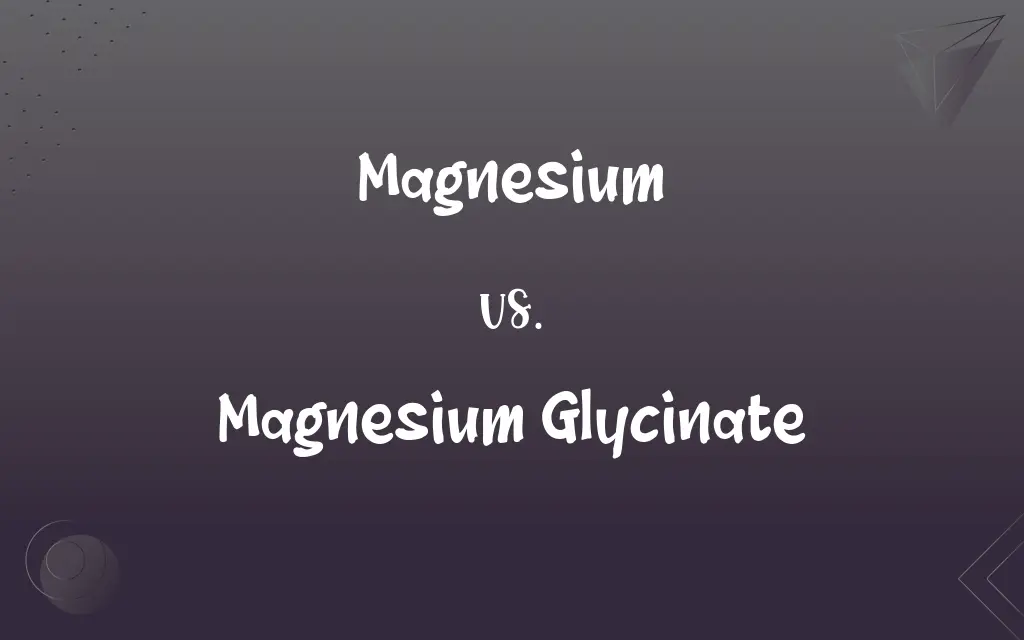Magnesium vs. Magnesium Glycinate: What's the Difference?
Edited by Harlon Moss || By Janet White || Published on December 10, 2023
Magnesium is a chemical element essential for human health, while magnesium glycinate is a magnesium salt used for better absorption and tolerance.

Key Differences
Magnesium is a chemical element, represented by the symbol Mg, essential in human biology for various physiological functions. Magnesium glycinate, however, is a compound formed by combining magnesium with glycine, an amino acid, enhancing magnesium's bioavailability and absorption.
In its elemental form, magnesium is involved in over 300 biochemical reactions in the body, including energy production and protein synthesis. Magnesium glycinate is specifically designed to be more easily absorbed by the body and is often used as a dietary supplement.
Magnesium, in its various forms, is crucial for muscle and nerve function, blood glucose control, and bone health. Magnesium glycinate, by being bound to glycine, is less likely to cause gastrointestinal issues, a common side effect with other magnesium supplements.
The body requires magnesium in significant amounts, which is usually obtained through diet. Magnesium glycinate is often recommended for individuals with magnesium deficiency or for those who need a supplement that is gentle on the stomach.
Magnesium is available in many foods, such as nuts, seeds, and green leafy vegetables, while magnesium glycinate is specifically formulated for supplemental use, often recommended for its calming and relaxing effects on the body and mind.
ADVERTISEMENT
Comparison Chart
Nature
Chemical element (Mg)
Magnesium salt combined with glycine
Role in Body
Involved in numerous biochemical reactions
Enhanced absorption, gentle on stomach
Primary Use
Essential mineral for health
Dietary supplement for specific needs
Absorption
Varies based on dietary source and form
Specifically formulated for high bioavailability
Side Effects
Can cause gastrointestinal issues in some forms
Less likely to cause gastrointestinal issues
ADVERTISEMENT
Magnesium and Magnesium Glycinate Definitions
Magnesium
Magnesium is a chemical element essential for human health.
Magnesium is crucial for maintaining healthy bone density.
Magnesium Glycinate
Magnesium glycinate is known for its high bioavailability.
Magnesium glycinate supplements are effective for magnesium deficiency.
Magnesium
Magnesium is necessary for proper muscle and nerve function.
Adequate magnesium intake helps prevent muscle cramps.
Magnesium Glycinate
Magnesium glycinate supplements support mental and physical health.
Athletes use magnesium glycinate for muscle recovery.
Magnesium
Magnesium plays a vital role in over 300 enzymatic reactions.
Magnesium aids in the metabolism of food into energy.
Magnesium Glycinate
Magnesium glycinate is a magnesium salt combined with glycine.
Magnesium glycinate is often used to improve sleep quality.
Magnesium
Magnesium is obtained through dietary sources like green vegetables.
Spinach and almonds are rich sources of magnesium.
Magnesium Glycinate
Magnesium glycinate is less likely to cause gastrointestinal issues.
People with sensitive stomachs may prefer magnesium glycinate.
Magnesium
Magnesium contributes to cardiovascular health.
Magnesium is important for maintaining a regular heartbeat.
Magnesium Glycinate
Magnesium glycinate is used for its calming effects on the body.
Magnesium glycinate can help alleviate anxiety and stress.
Magnesium
A light, silvery-white, moderately hard metallic element that in ribbon or powder form burns with a brilliant white flame. Obtained chiefly from magnesite, dolomite, and bodies of salt water, it is used in structural alloys, pyrotechnics, flash photography, and incendiary bombs. Atomic number 12; atomic weight 24.305; melting point 650°C; boiling point 1,090°C; specific gravity 1.738 (at 20°C); valence 2. See Periodic Table.
Magnesium
The chemical element (symbol Mg) with an atomic number of 12. It is a light, easily flammable, silvery-white alkaline earth metal.
Magnesium
A light silver-white metallic element of atomic number 12, malleable and ductile, quite permanent in dry air but tarnishing in moist air. It burns, forming (the oxide) magnesia, with the production of a blinding light (the so-called magnesium light) which is used in signaling, in pyrotechny, or in photography where a strong actinic illuminant is required. Its compounds occur abundantly, as in dolomite, talc, meerschaum, etc. Symbol Mg. Atomic weight, 24.305. Specific gravity, 1.75.
Magnesium
A light silver-white ductile bivalent metallic element; in pure form it burns with brilliant white flame; occurs naturally only in combination (as in magnesite and dolomite and carnallite and spinel and olivine)
FAQs
What is magnesium glycinate used for?
It's a dietary supplement known for its high absorption and gentle effect.
Can magnesium help with energy production?
Yes, it plays a crucial role in converting food into energy.
How does magnesium support health?
It's involved in numerous enzymatic reactions, muscle function, and bone health.
What are natural sources of magnesium?
Green leafy vegetables, nuts, and seeds are good sources.
What is magnesium?
It's a chemical element essential for various physiological functions.
Why choose magnesium glycinate over other forms?
It's less likely to cause gastrointestinal issues and has high bioavailability.
How much magnesium is needed daily?
The recommended amount varies by age, gender, and health conditions.
Does magnesium aid in bone health?
Yes, it's crucial for maintaining bone density.
Is magnesium glycinate effective for muscle recovery?
Yes, athletes often use it for muscle health and recovery.
Is magnesium glycinate good for sleep?
Yes, its calming effects can improve sleep quality.
Can magnesium glycinate help with anxiety?
Its calming effects can be beneficial for those with anxiety.
Can magnesium glycinate cause side effects?
It's less likely to, but high doses may cause mild side effects like diarrhea.
Is dietary magnesium sufficient for daily needs?
It can be, but some individuals may require supplements.
Can magnesium interact with medications?
Yes, it can interact with certain medications, so it's important to consult a doctor.
What are symptoms of magnesium deficiency?
Muscle cramps, fatigue, and irregular heartbeat are common symptoms.
Can magnesium glycinate aid in stress relief?
Yes, it's known for its relaxing and stress-reducing properties.
How quickly does magnesium glycinate work?
The effects can vary, but some people notice improvements within days.
How does magnesium impact heart health?
It helps maintain a regular heartbeat and supports cardiovascular health.
Should magnesium supplements be taken with food?
Taking them with food can improve absorption and reduce stomach upset.
Is magnesium glycinate suitable for everyone?
It's generally safe, but it's best to consult with a healthcare provider.
About Author
Written by
Janet WhiteJanet White has been an esteemed writer and blogger for Difference Wiki. Holding a Master's degree in Science and Medical Journalism from the prestigious Boston University, she has consistently demonstrated her expertise and passion for her field. When she's not immersed in her work, Janet relishes her time exercising, delving into a good book, and cherishing moments with friends and family.
Edited by
Harlon MossHarlon is a seasoned quality moderator and accomplished content writer for Difference Wiki. An alumnus of the prestigious University of California, he earned his degree in Computer Science. Leveraging his academic background, Harlon brings a meticulous and informed perspective to his work, ensuring content accuracy and excellence.






































































